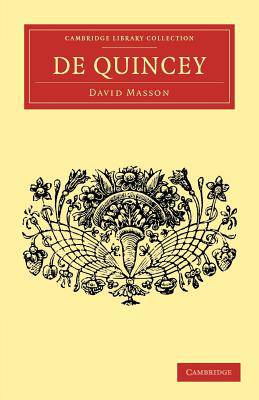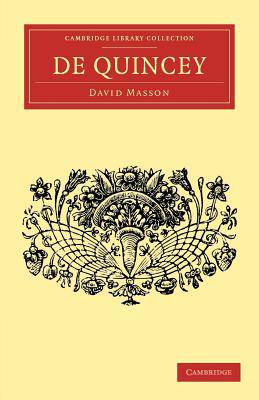
- Afhalen na 1 uur in een winkel met voorraad
- Gratis thuislevering in België vanaf € 30
- Ruim aanbod met 7 miljoen producten
- Afhalen na 1 uur in een winkel met voorraad
- Gratis thuislevering in België vanaf € 30
- Ruim aanbod met 7 miljoen producten
Zoeken
€ 57,95
+ 115 punten
Uitvoering
Omschrijving
Combining intellectual enthusiasm with analytical bite, David Masson's biography of the self-confessed opium eater provides readers with valuable insights into an author whose life oscillated between respectability, vagrancy and infamy. Published in the first series of English Men of Letters in 1881, only two decades after the death of Thomas de Quincey (1785-1859), and written by a man who, like his subject in his more prosperous years, was a journalist and editor in the heart of literary London, Masson's account describes a man and a nation at the peak of their cultural influence. Covering not only the Confessions, but also his less well known essays in the London Magazine, Blackwood's, the Edinburgh Saturday Post and the Instructor, this literary portrait places the life - debts and drug use, but also fame, success and the friendship of some of the greatest writers of the age - in the context of the works.
Specificaties
Betrokkenen
- Auteur(s):
- Uitgeverij:
Inhoud
- Aantal bladzijden:
- 214
- Taal:
- Engels
- Reeks:
Eigenschappen
- Productcode (EAN):
- 9781108034593
- Verschijningsdatum:
- 3/11/2011
- Uitvoering:
- Paperback
- Formaat:
- Trade paperback (VS)
- Afmetingen:
- 140 mm x 216 mm
- Gewicht:
- 276 g

Alleen bij Standaard Boekhandel
+ 115 punten op je klantenkaart van Standaard Boekhandel
Beoordelingen
We publiceren alleen reviews die voldoen aan de voorwaarden voor reviews. Bekijk onze voorwaarden voor reviews.











